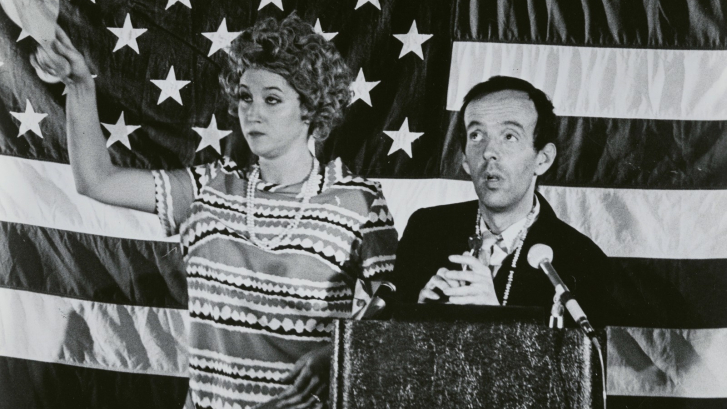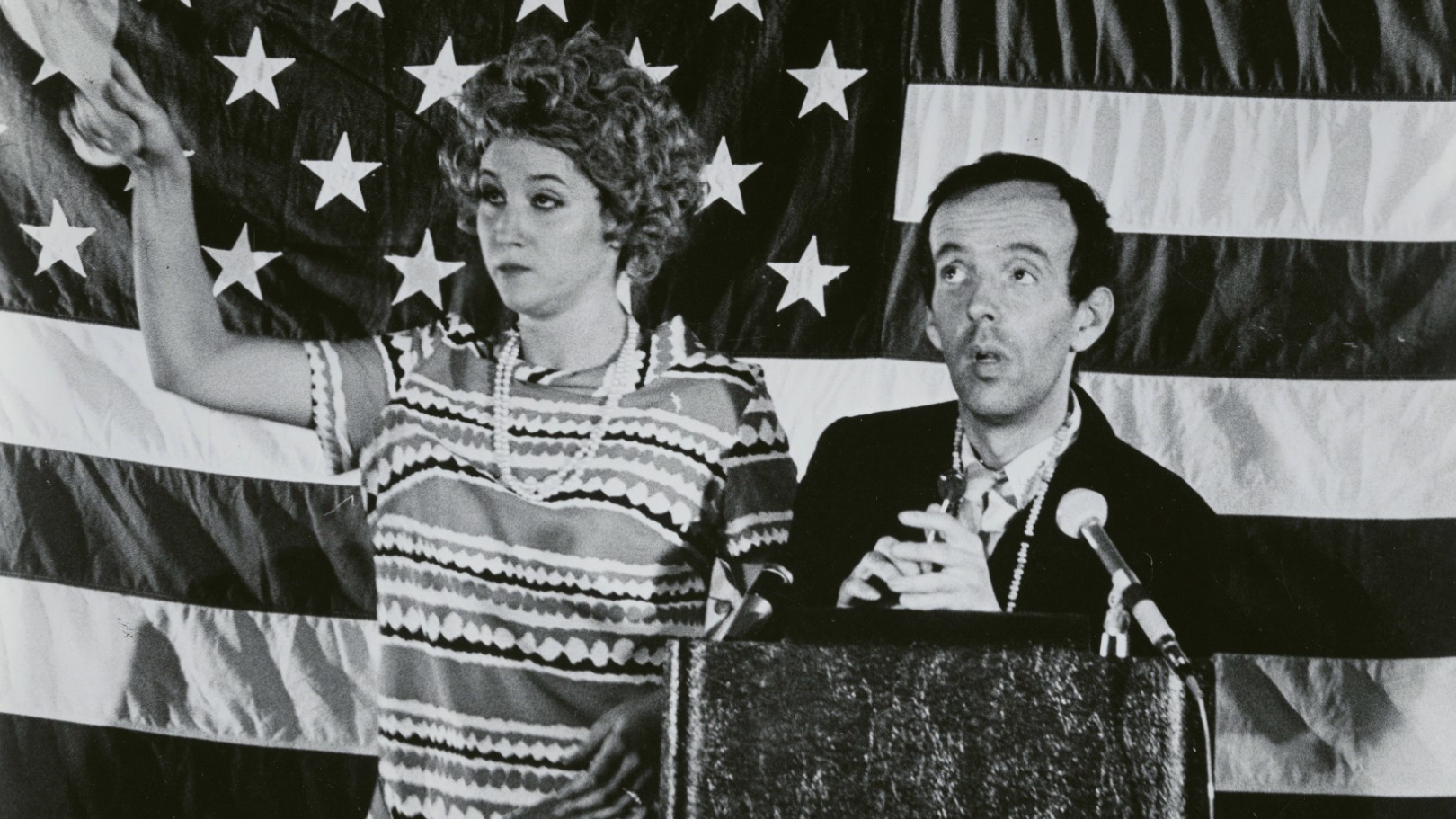Brand X

Praised by Jonas Mekas in 1970 as “propaganda for the politics of joy and disorder”, painter and writer Wynn Chamberlain 's BRAND X is back - finally! - to provide contemporary audiences with a strangely refreshing dose of late '60s countercultural humor and political satire. After a successful run throughout the USA in the early '70s, the only print of the film disappeared for almost 40 years before mysteriously resurfacing in its production company's vaults. The film, an anarchic, episodic riff on the irrelevance and crass commercialism of the television programming of its day, features underground superstar Taylor Meadat the height of his inventive insanity. Appearing in numerous unlikely roles, including that of an exercise trainer, a preacher and the US president, Mead is joined by a fantastic cast of Warhol superstars ( Ultra Violet , Candy Darling and Tally Brown ) and other '60s personalities and anti-establishment figures , such as Sally Kirkland , Sam Shepard , and Abbie Hoffman .
An American Truth Comedy
BRAND X, conceived and born between 1968 and early 1970, uses simplistic television programming of that era as a frame with which to expose and ridicule the politics and taboos of the day. BRAND X is subversive in that it undermines and deconstructs broadcast TV so that your belief in its rationality is seriously challenged. When viewing BRAND X now, forty years later, it is important to recall that six months before production of this picture began, Martin Luther King and Robert F. Kennedy had both been murdered, Richard Nixonhad just been sworn in as President of the United States, and two weeks before BRAND X opened in New York, at a university in Ohio, the National Guard over a period of thirteen seconds fired sixty-seven rounds of ammunition into an unarmed group of students protesting the US invasion of Cambodia. Four students were killed, nine were permanently paralyzed and many injured.
This raises an interesting question. At the recent screening in New York at The New Museum on April 9, 2011, most of the audience hadn't been born by 1970, when BRAND X originally premiered. So what were they laughing at? The objects of ridicule on which the film focuses, including army personnel and President Nixon and his wife, are long forgotten. Or are they? Did the issues the film deals with seem quaint? Or is there something beyond time, something inescapably ridiculous about Man's existence, his desires, and needs which transcends everything else?
Disastrous 1968
And yet, 1968-69 was historically a disastrous period. So terrible that Lil Picard, an exiled survivor of the German disaster of the 1930s writing in inter / View magazine , compared it to the last days of the Weimar Republic in Germany immediately before Hitler and his gang took power; she recalled a poem written by the famous dramatist Bertolt Brecht whose first line reads, "Really we are Living in Disastrous Times."
Picard, writing about BRAND X in 1970, went on to predict that, "It could well be this film (BRAND X) will in time become a Brechtian Truth Comedy, a prophetic metaphor for many of the things we would soon be experiencing in American life. ”
And so it was. Just as the freedom of the Weimar Republic in Germany brought on the repressions of the Nazi party, so did the desire for justice and freedom in the United States nurture the Woodstock Festival , the antics of the Chicago Seven , the Black Panthers and countless other revolutionary groups which inevitably gave way to a new recidivist movement that began with Nixon, was bowdlerised by Gerald Ford , glamorized by Ronald Reagan and carried to unprecedented levels of attacks on the Constitution of the United States and other public institutions by George W. Bush - from which the country may never recover. At BRAND X, however, people are laughing. Abraham Lincoln is quoted as saying, "With the fearful strain that is upon us night and day, if I did not laugh, I should die." But why do we laugh at the prophetic misery of mass production and the boredom of the assembly line with Charlie Chaplin in his great subversive film Modern Times ? Some of our laughter for BRAND X may be that the problems of those days seem simple compared to those that now confront us. Why do we laugh at the exhausted gestures of Taylor Mead's hilarious wit mixed with deadly poison? Why do we laugh when people fall down - the Marx Brothers , Ultra Violet? Neither Chaplin nor Mead tells jokes, but everything about them is funny. Why?
Fun, Funny, Jest, Joke, Jester: all these states include their mirror image, their opposite - something about desiring, struggling against all odds, against Fate and rising above her. When people spend their lives ignoring everything but their own desires, focusing only on their “careers”, accumulating objects like wives or husbands, grand houses and wealth beyond their needs, then lose it all in a matter of days or weeks because of some inherent flaw in their planning, their character, or the system, is this laughable or is it tragic? How severe does a fall have to be - a fall from power, loss of face, losing a war because of the hubris of the rulers, how long before these are no longer laughable? You can rant and rave at the powerful who openly proclaim they are the rulers of the world, but to laugh at them as BRAND X does causes one to catch one's breath and laugh in relief that someone has done it at last. To laugh at the voodoo of powerful ogres, however, can be dangerous. BRAND X was blackballed and shut down because it was among the first to do so.
Homage to Voltaire and Jarry
In this sense, the laughter BRAND X generates like a bunch of garlic suspended from above the doorways of houses in medieval times to scare away the voodoo of tyrants, their witches and sorcerers and to defeat their allies, Fate and Necessity. The American writer Mark Twain said, "The human race has only one really effective weapon and that is Laughter."
For the more subtle-minded, there are, of course, endless visual and compositional references in BRAND X: a silent homage to Voltaire , who said, "God is a comedian playing to an audience too afraid to laugh." Abbie Hoffman's performance is a salute to the proto-Dadaist, Alfred Jarry and his play Ubu Roi , which opened and closed in 1896, and to the Café Voltaire in Zurich whereDada was born. In BRAND X there are unspoken references to various Theaters of the Ridiculous , subtle references to Ronald Tavel , to the thoughts and works of Tristan Tzara , Raoul Hausmann and Rose Selavy / Marcel Duchamp , who was a great fan of Taylor Mead and attended many performances of BRAND X when it was playing at the Elgin Theater in New York. “Cut-up” techniques dating back to Gertrude Stein , via Brion Gysin , evolve visually and echo back and forth between television and film, touching on various jazz and cinematic riffs and the insights of filmmakers likeFellini , Ron Rice , Godard and Jack Smith , often showcased by Jonas Mekas at his Cinematheque. All of these elements, of which most of the cast were well aware, were working invisibly to make BRAND X what it is today, an American Truth Comedy. As someone in the audience yelled triumphantly at the end of Taylor's nightly sermon, “BRAND X is immortal!” - Wynn Chamberlain (Source: Berlinale Catalog )
details
-
Runtime
87 min -
Country
United States -
Year of Presentation
2012 -
Year of Production
1970 -
Director
Wynn Chamberlain -
Cast
Taylor Mead, Sally Kirkland, Ultra Violet, Frank Cavestani, Tally Brown, Abbie Hoffman, Candy Darling, Carlos Anduze, Joy Bang, Serge Bouterline, Madalyn Lloyd, Jim Maya, Sam Shepard, Sam Ridge, Jim Huff, John Long, Susannah Baumgart -
Production Company
Trax Productions -
Berlinale Section
Forum -
Berlinale Category
Feature Film
pictures from the movie
